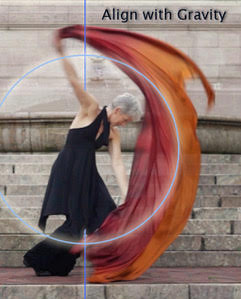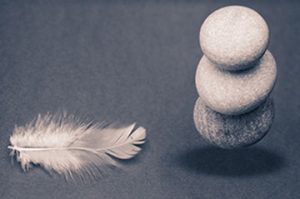BodyLogos Blog
Welcome to the BodyLogos blog. Here’s where you’ll get your dose of alignment and balance with grace. (Sign up here to join 1,000 other blog subscribers.)
Redefining Strength
I want to change our perception of strength. Strength is the ability to meet resistance and influence an outcome without compromising ourselves. And we already have it.
Strength is not an attribute; it’s a state of being. Gladiators, bodybuilders, and football players demonstrate strength through brute force, sheer willpower, muscle mass, and relentless pursuit. But we’re also quick to identify dancers and martial artists as strong. Their medium taps into a sense of vulnerability, balance, alignment, controlled power, and grace—but no one can deny their strength. Strength may look different on each of us, but it is an inherent part of who we are.
You are not weak by nature; you are stronger than you think. Your strength is not something you need to kill yourself to gain—it is already within you, waiting to be excavated. The key is to stop chasing something you already have and tap into it, so you can manifest that strength in your everyday life.
Because we don’t think we’re strong, we approach resistance with the idea that we’re not enough. We throw everything we have at it and push past our physical, mental, and emotional limitations. We see strength as domination, but it’s not.
When you learn to listen to your body’s divine wisdom, you cultivate a sense of where your body is developing tension instead of standing in its strength. You end the vicious cycle of unrealistic expectations, injury, and self-criticism and learn how to consciously embrace responsible growth. You stop compartmentalizing your strength into emotional, physical, and mental pieces and operate from the strength of your being at all times.
You learn how to align yourself with gravity—instead of working against it—so you can channel your strength to meet life’s resistance. As you meet resistance with equal parts power and alignment, you transform tension into strength
As in the sword dance above, the power lies in bringing just the right amount of force—not too little and not too much. By meeting the sword’s weight, I meet gravity. I am tapped into a larger source of energy, free of tension, and discover a strength that is wholly and uniquely mine.





 About Tammy Wise
About Tammy Wise
The Emotional Yo-Yo of Healing
by Tammy WiseBetween internal scrutiny—examining how an injury could have been avoided—and external perception—experiencing how your world responds to your injury—the ups and downs of healing goes beyond the body’s health. It’s an emotional yo-yo!
Being diagnosed with plantar fasciitis accompanied by a fascia tear led to months of physical compromise. I gimp around with a cane; I can’t demonstrate while training clients; I struggle with a single grocery bag.
I haven’t felt free to be me. And, the worst part is, I don’t feel beautiful.
Finally, it was explained to me by Ming Chew, a NYC PT fascia specialist, that I was quite dehydrated and my fascia was brittle. In addition to his therapy, he put me on a hydration regime with minerals to condition the fascia and permit healing.
I felt responsible for and irresponsible about this depletion!
I blamed myself for the tear and drank water like my life depended on it!!
After 2-weeks of this regime I was thirsty for the first time in possibly a decade. I was thrilled that my body’s hydration meter was back on the clock and my general condition was improving.
At this juncture I felt relieved that this dehydration issue was caught before it caused problems on a deeper organ level. Shame turned to celebration!
At every incremental improvement, a celebration would soften the blame for having allowed such a condition to creep up on me. After all, I’m an athlete and trainer who’s in constant dialogue with her body!?! How could this have happened?!?
Initially, my limp prompted questions from folks, and a huge percentage of them had experienced plantar fasciitis before. Nearly everyone recommended calf stretches, including the doctor. But it felt wrong to me. It produced the wrong type of pain.
Reluctantly, I followed these orders until a cane became my constant companion. It was after this that Ming came onto the scene and determined that stretching likely worsened the fascia’s tear.
With every well-meaning person who gave stretching advice I’d be seething under my breath. They’d say, “I know just how you feel. I experienced the same thing.” I’d think to myself, “If your advice helped you, you really don’t know how I feel!”
Humanity redeemed itself, in my eyes, at my boyfriend Anthony’s gig one night. He leads the stage on the drums, while historically, I’d lead the dance floor on my feet. But, I only had one foot!?!
If you’re a dancer or know one, you know that you can’t keep a dancer down when they love the music. It’s in the blood!
Friends enjoyed my chair/cane dance, and fellow dance floor companions borrowed some of my one-legged moves. But the greatest moment came when Anthony and I danced together to the next band.
Alone on the dance floor, onlookers were visibly inspired. They saw a man loving his woman, and a woman untethered by her limitations, doing what they too wanted to do—dance with abandon.
I felt happy to be moving, cane or no cane. I felt free to be in the moment, injury or no injury. I felt innocence and acceptance, perfect or imperfect. I felt beautiful again.
My smile stretched from ear to ear, and I finally elevated above my condition.
What happened that night, with the help of many onlooking strangers, friends and Anthony, was I realized I AM HEALTHY. Healing is a process that takes time, but the miracle of regeneration was in tact, no matter the fault or learning curve of my circumstances.
We are self-regenerative in mind and body. The only thing that we can always count on is change. And as long as we strive to be our best, without constantly scrutinizing our performance, that change will elevate us.
No matter your circumstances, accept your innocence and expect positive change.